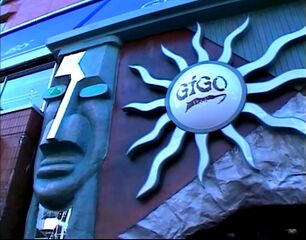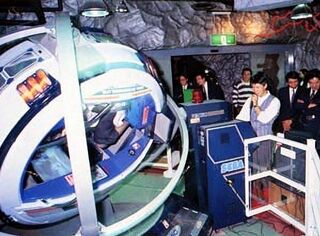Difference between revisions of "Roppongi GiGO"
From Sega Retro
| Line 12: | Line 12: | ||
'''{{PAGENAME}}''' (六本木GiGO) is a former Japanese game centre jointly developed by [[Sega]] and [[wikipedia:Ibis (hotel)|Ibis]], which owned the hotel it was situated in.{{magref|famitsu|199|10}} | '''{{PAGENAME}}''' (六本木GiGO) is a former Japanese game centre jointly developed by [[Sega]] and [[wikipedia:Ibis (hotel)|Ibis]], which owned the hotel it was situated in.{{magref|famitsu|199|10}} | ||
| − | + | Opened with the aim of attracting Roppongi's adult nightlife, the venue was the first [[GiGO]]{{magref|segamagjp|7|36}} and among Sega's largest up to that point in time, with its September 1992 opening representing one of the company's first steps in establishing large scale entertainment centres. Its high profile status and popularity gave it significant mainstream media coverage,{{ref|https://xtrend.nikkei.com/atcl/trn/pickup/15/1008498/102200986/}} as well as famous visitors - [[Michael Jackson]] visited the site in December 1992,{{ref|https://mdshock.com/2020/12/08/michael-jackson-visits-sega-in-japan-december-1992/}} alongside other notable figures including [[wikipedia:Megumi Hayashibara| Megumi Hayashibara]].{{magref|bemega|1994-05|63}} | |
| − | Roppongi GiGO is thought to have lost Sega's involvement sometime after the late 1990s | + | Roppongi GiGO is thought to have lost Sega's involvement sometime after the late 1990s. It continued to operate as a game centre in a downsized capacity under the name of Roppongi Vortex,{{ref|https://web.archive.org/web/20010426214157/http://www.st.rim.or.jp/~k-nishi/tgm/roppongi.html}} later closing permanently at the end of 2013.{{ref|http://throwbackjapan.blogspot.com/2014/03/arcade-vortex-roppongi-tokyo.html}} |
==Layout== | ==Layout== | ||
| − | Establishing an organised concept also seen in subsequent GiGO locations, Roppongi GiGO's four floors were | + | Establishing an organised concept also seen in subsequent GiGO locations, each of Roppongi GiGO's four floors were devoted to specific machines and attractions - the first floor featured video games, including deluxe ''[[Virtua Racing]]'' and [[R360]] units, the second housed prize redemption, sports games, and a bar,{{intref|Press release: 1994-02-07:Shisetsu-nai inshoku tenpo shirīzu `aisu biru'(Tōkyō Roppongi) hoteru goraku inshoku zōn}} the third featured medal games, and the fourth contained a casino area and karaoke rooms. Customers had to be at least 18 years of age to enter, and 20 to access the fourth floor's casino area.{{magref|famitsu|199|10}} |
The floors were featured in segments of the [[Mega Drive Perfect Video '92~'93]] promotional video, with ''[[Dream Palace]]'' and ''[[Royal Ascot]]'' machines demoed. | The floors were featured in segments of the [[Mega Drive Perfect Video '92~'93]] promotional video, with ''[[Dream Palace]]'' and ''[[Royal Ascot]]'' machines demoed. | ||
Revision as of 18:21, 21 April 2021
| Roppongi GiGO |
|---|
| Location: 東京都港区六本木七丁目14番4号 アイビス共同ビル5階, Japan |
| Opened: 1992-09-18[1] |
| Closed: 1998 |
Roppongi GiGO (六本木GiGO) is a former Japanese game centre jointly developed by Sega and Ibis, which owned the hotel it was situated in.[1]
Opened with the aim of attracting Roppongi's adult nightlife, the venue was the first GiGO[2] and among Sega's largest up to that point in time, with its September 1992 opening representing one of the company's first steps in establishing large scale entertainment centres. Its high profile status and popularity gave it significant mainstream media coverage,[3] as well as famous visitors - Michael Jackson visited the site in December 1992,[4] alongside other notable figures including Megumi Hayashibara.[5]
Roppongi GiGO is thought to have lost Sega's involvement sometime after the late 1990s. It continued to operate as a game centre in a downsized capacity under the name of Roppongi Vortex,[6] later closing permanently at the end of 2013.[7]
Layout
Establishing an organised concept also seen in subsequent GiGO locations, each of Roppongi GiGO's four floors were devoted to specific machines and attractions - the first floor featured video games, including deluxe Virtua Racing and R360 units, the second housed prize redemption, sports games, and a bar,[8] the third featured medal games, and the fourth contained a casino area and karaoke rooms. Customers had to be at least 18 years of age to enter, and 20 to access the fourth floor's casino area.[1]
The floors were featured in segments of the Mega Drive Perfect Video '92~'93 promotional video, with Dream Palace and Royal Ascot machines demoed.
Branding
| Name | Branding | Date |
|---|---|---|
| Roppongi GiGO (六本木GiGO) | GiGO | 1992-09-18[1] |
| Closed | 1998 | |
Magazine articles
- Main article: Roppongi GiGO/Magazine articles.
Gallery
Footage from Bad Influence! report on Japan, c. late 1992
References
- ↑ 1.0 1.1 1.2 1.3 Famitsu, "1992-10-09" (JP; 1992-09-25), page 10
- ↑ Sega Magazine, "1997-05 (1997-05, 06)" (JP; 1997-04-11), page 36
- ↑ https://xtrend.nikkei.com/atcl/trn/pickup/15/1008498/102200986/
- ↑ https://mdshock.com/2020/12/08/michael-jackson-visits-sega-in-japan-december-1992/
- ↑ Beep! MegaDrive, "May 1994" (JP; 1994-04-08), page 63
- ↑ http://www.st.rim.or.jp/~k-nishi/tgm/roppongi.html (Wayback Machine: 2001-04-26 21:41)
- ↑ http://throwbackjapan.blogspot.com/2014/03/arcade-vortex-roppongi-tokyo.html
- ↑ Press release: 1994-02-07:Shisetsu-nai inshoku tenpo shirīzu `aisu biru'(Tōkyō Roppongi) hoteru goraku inshoku zōn
| GiGO venues in Japan |
|---|
| Akihabara | Gifu | Hiroshima | Ikebukuro | Roppongi | Shibuya | Shinsaibashi | Tenjin |


